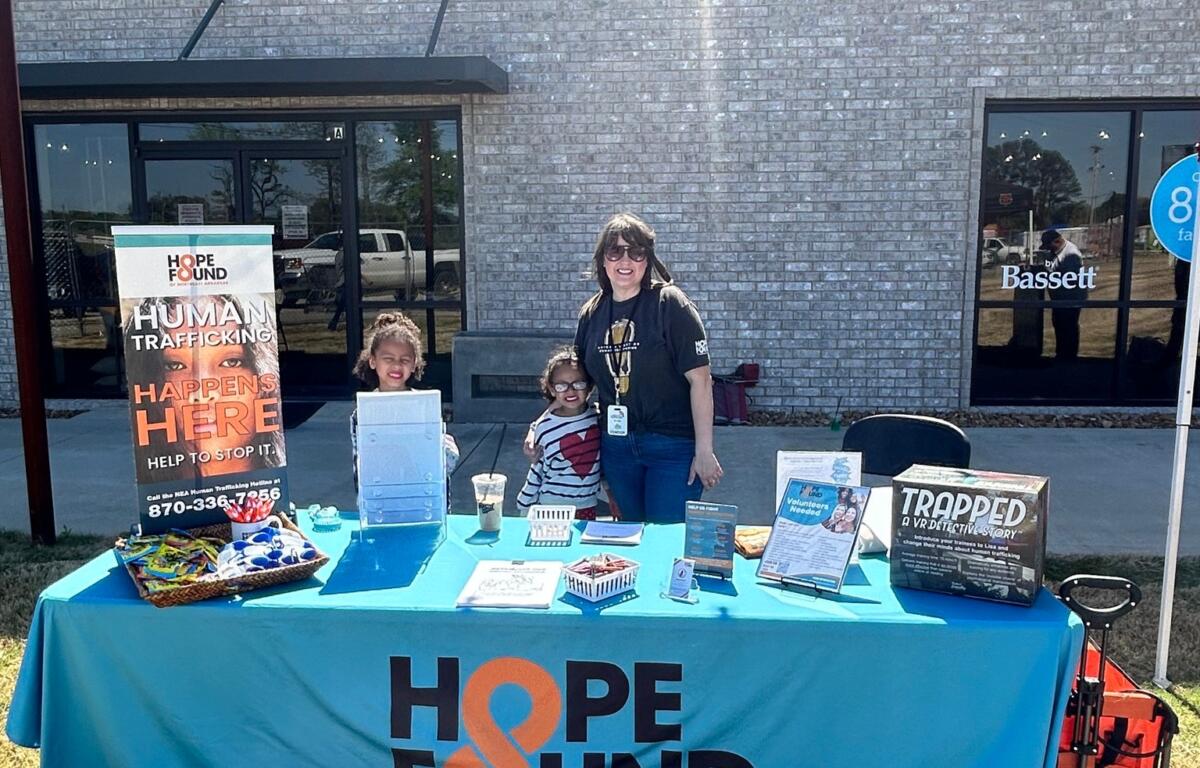Jonesboro, AR – (JonesboroRightNow.com) – Jan. 18, 2025 – After reading a number of headlines about victims of human trafficking in Northeast Arkansas, a Jonesboro woman decided seven years ago she needed to spread awareness about the issue and help victims.
These headlines from 2018 included a young girl from Trumann who went missing, and it was later learned that she was the victim of sex traffickers. Another young girl disappeared from Mississippi County and was later found in Washington state as a victim of a trafficking operation. In Jonesboro, the manager of the now-closed Kirin restaurant was arrested and later charged with rape and trafficking.
They caught the attention of Megan Brown and a group of like-minded women, who thought there not only needed to be more education and awareness in the community about this issue, but also a program to provide services for these victims. As a result, Hope Found of Northeast Arkansas was born.
Brown is the executive director and co-founder of the nonprofit that officially started in April 2019. She’s the driving force of this effort to create awareness of the issue and coordinate services for victims and survivors of trafficking.
“Human trafficking is a crime that’s hidden in plain sight. And it doesn’t happen like you see in the movies,” Brown explained. “People might think there’s kidnapping involved, that people are trapped in a basement, tied up in chains…that can happen, but in reality, your child could be going to school with a victim of trafficking. You might be working with a victim of trafficking. Your waiter or your nail tech… they could be a victim of human trafficking. Very rarely is a person chained up. It’s more about the psychological chains that keep them trapped.”

Brown said the victim and the trafficker often know each other, and that Hope Found sees lots of familial trafficking. She added that traffickers are often men.
“The trafficker uses force, fraud or coercion to make an adult or minor provide a sex act, where something of value is being exchanged for sex,” she said. “It could be money, but it could also be drugs, or clothing, food or shelter. Or the trafficker is forcing someone to work in a job setting where the employee believes that if they said ‘I’m not going to do this anymore’ and try to leave the situation, but they couldn’t out of fear, that’s ‘labor trafficking’.”
Kids, homeless people, single parents who’ve recently lost their jobs, people struggling with drug addiction and children in foster care are often vulnerable to trafficking, Brown said.
“A trafficker comes along and gives them hope. ‘I can do this for you. I can help you make some quick cash. I’ve got a job for you.’ The victim believes them because they’re desperate, and then they’re caught up in a trafficking situation,” she said.

To help, Hope Found provides case management and advocacy services. This can include teaching healthy coping skills, finding the victim a new place to live, and more. There’s also a “blessing closet” filled with hygiene supplies, makeup and some emergency clothing. All of the services provided by Hope Found are free.
“We build out an action plan and start by working on one to two goals for the next few months. We’re really just trying to meet them where they’re at. We want to make sure they’re healthy. If they have medical issues, we’ll get them to the right person and get that taken care of,” Brown said. “We don’t provide therapy, but we help them work on coping skills and triggers so that when they do go to therapy, they have some foundational skills that they’ve learned.”
The need is growing, Brown said, as Hope Found served 48 adults and 22 minors in 2024.
Volunteers are a key component. They don’t help with clients directly, instead acting as support for the Hope Found team.
Ky Taylor is one of the survivor advocates. She’s had extensive training to deal with victims of human trafficking and trauma.
“Our work is important and invaluable, but our struggle right now, as an organization, is our capacity. We desperately need funding in order to hire another advocate. We serve 11 counties in Northeast Arkansas and we’re barely scratching the surface. We do a little bit in each county every year, but there’s opportunity to do more. I want to be able to serve more people,” Brown said.

Hope Found receives assistance from the City of Jonesboro in the form of a grant and funding from United Way. Grants total about 25% of the funding. The rest comes from fundraising and monthly donors. Brown said she’s looking for people who’ll commit to a monthly gift or who can give gift cards. She will often use gift cards to take a client to eat.
To donate, visit hopefoundnea.org and click the “donate now” button. People can also mail in a donation in the form of a check if they don’t want to give online.
The phone number to call for help is 877-688-HOPE (4673).


